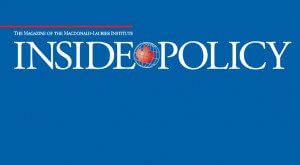 Health Minister Jane Philpott is right that medicare won’t be fixed by throwing more money at the provinces. Her government has the opportunity to learn the lessons of the last 50 years, and propose real reforms to Canadian health care.
Health Minister Jane Philpott is right that medicare won’t be fixed by throwing more money at the provinces. Her government has the opportunity to learn the lessons of the last 50 years, and propose real reforms to Canadian health care.
By Brian Ferguson
When federal Health Minister Jane Philpott told the Canadian Medical Association in August that more money isn’t the only solution to medicare’s problems, and in October told provincial health ministers that Ottawa didn’t want to get locked into an open-ended spending commitment, she was really just pulling out one of the golden oldies of the health policy debate that goes back to medicare’s beginnings.
When medicare came in, in the late 1960s, the feds made per capita transfers to the provinces equal to roughly half of national per capita spending (the formula actually differed between transfers for hospital and physician costs). Ottawa quickly concluded that health-care costs were not being brought under control and that it had got itself into an open-ended spending commitment, so it shifted to established programs funding which, among other things, involved the feds cutting some of their tax rates so that the provinces could increase theirs, without taxpayers having to pay more in total taxes. Because one percentage point in income tax brought a richer province more than it did a poorer province, the feds added a cash payment designed to roughly equalize capacity. The value of a tax point would rise roughly in line with a province’s GDP and the federal cash contribution was also tied to the rate of increase of GDP, just as under the latest change.
Dr. Philpott is right when she says that we need to do something other than just spend more, but her proposals are also golden oldies.
That initiated a never-ending tale, with the provinces arguing that federal cash transfers should cover half of health-care spending (but not offering to give back the tax points) and with the structure of the system being reorganized regularly — first expanding Established Programs Financing into the Canadian Health and Social Transfer, then separating the Health Transfer from the Social Transfer. Curiously, none of the re-shuffling of the organizational chart brought costs under control, in the eyes of finance departments.
Dr. Philpott is right when she says that we need to do something other than just spend more, but her proposals are also golden oldies. Yes, electronic health records will be cost-savers (if you ignore what the provinces have already spent without results) but they won’t slow the long-term rate of cost increase. As for targeted federal contributions, the Kirby Senate committee was told about that 15 years ago — the arguments haven’t changed. And as for the debate about whether an aging population does or does not drive costs up? This is the baby boom generation we’re talking about. Surely, someone should have worked that out by now.
So we need a fundamental re-thinking, not just another Romanow commission, and the feds are going to have to do most of the work on it. Provincial governments have their hands full just keeping the system running, plus they have a tendency to grab for magic solutions. Ontario, Quebec, and B.C. have all brought in primary care reorganizations which have not met their cost-control objectives, and none of the provinces has put in place mechanisms to evaluate the changes, so nobody has a really good handle on what happened as a result of the changes.
We need to look seriously at what’s driving costs, think seriously about what we should expect to pay for a national health-care system, and re-think how we fund it.
Back in medicare’s early days, the federal minister of health was a major political player — think Marc Lalonde. Since then, not so much. Fixing health care requires that this be changed. When Ottawa said it would cut back its cash commitment to medicare by reducing the increase in the annual Canada Health Transfer from 6 to 3 percent in 2017, it also let its analytic capability in health economics atrophy. There’s still a solid base there, but it needs to be given additional resources. No free-floating structures; do it in-house. As part of the process, we need to forget the idea that our system is the envy of the world, and start looking seriously at what’s been done elsewhere because any ideas we’re mooting will have been tried somewhere in the past decades (ironically, The Economist magazine recently said the same thing about Britain’s National Health Service). We need to abandon outdated shibboleths and do something about answering the questions which have hung around for over 40 years now. We need to look seriously at what’s driving costs, think seriously about what we should expect to pay for a national health-care system, and re-think how we fund it.
We should have done all of that back in the 1980s, but we were too locked into the idea that we had found the health-care sweet spot. Now we need to take what we, and others, have learned about national health-care systems over roughly 50 years and make it the basis of a serious analytical effort.
Or we could go on watching costs rise, the system deteriorate, and the feds and the provinces squabble over who should be signing the cheques.
Brian Ferguson is a professor of economics at the University of Guelph and a member of MLI’s Research Advisory Board.




